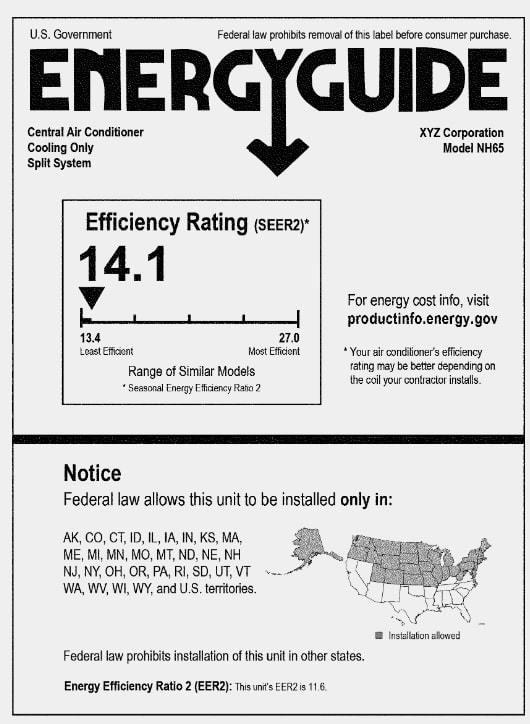What SEER Rating Should I Get For My Michigan Home?

One of the most important things you need to look at when buying an AC or heat pump is its “Seasonal Energy Efficiency Ratio” or SEER rating. This measures the energy efficiency of air conditioning systems, and is used to determine how much cooling a system can provide per unit of energy consumed. In short, the higher the SEER rating of an air conditioner, the more efficient it is at cooling, and the less you will pay in energy bills.
As of this year, however, there's a new standard: SEER2. These systems are more energy-efficient than previous models, and they tend to come with higher price tags too. To help you make a more informed decision on which system would be a better fit for your home and budget, we’ll explore:
- The difference between SEER and SEER2 ratings
- Michigan's minimum SEER2 rating
- The benefits of higher-efficiency SEER2 systems
Rather speak with trusted HVAC experts? Contact Thornton & Grooms!
Call Thornton and Grooms at (248) 644-7810 for a free in-home estimate on the best AC and heat pump brands for maximum efficiency. We’ll review your home size, comfort preferences, and budget, and then present at least 3 install options for you to choose from. We can also review financing options and help apply qualified rebates on your behalf!
The Difference Between SEER and SEER2 Ratings
Initially, the only rating provided by the U.S. Department of Energy (DOE) was SEER. It calculated the efficiency of AC and heat pump systems. While it provided consumers with some basic information, there were issues in the way that SEER ratings were calculated, as certain real world operating conditions were not taken into account. The SEER rating system could not accurately emulate the effects of external static pressure and ductwork on AC and heat pump systems. To resolve this, the U.S. Department of Energy created SEER2, which is an all new standard that measures the efficiency of AC systems.
The primary difference between SEER and SEER2 is that SEER2 accounts for static pressure in its calculation in an entirely different way. The updated rating system includes changes for minimum air handler static pressure, heating load calculation, heating mode test, off-mode power test, and fan power for coil-only units. This gives consumers a more accurate understanding of how efficient the system is.
Michigan's Minimum SEER2 Rating
Since January 1, 2023, all AC and heat pump installations in the U.S. have to meet higher energy-efficiency standards. The minimum of each state varies depending on which one of the three regions it belongs to. The three regions are southeast, southwest and north. Michigan is in the northern region. Northern regions tend to have lower requirements than southeast and southwest regions.
Since 2023, the DOE requires a minimum 14 SEER2 rating for all AC and heat pump installations in the northern region. It's recommended that you try to find systems that exceed this minimum.
The Benefits of Higher Efficiency SEER2 Systems
A SEER2 rating above 16.2 (or an equivalent to a 17 SEER rating) is considered to be highly efficient. Although a higher SEER2 rating may cost more upfront, it can save you money in the long run by reducing your energy bills and increasing the efficiency of your home's cooling system. It's also a worthwhile investment that can even improve the market value of your home in the long run.
Energy Savings

A higher SEER2 rating means that you'll enjoy more energy savings. Depending on how much you pay for energy, you can expect to reap significant energy savings over the system's life. Depending on the renates you qualify for, it might even end up covering the higher initial installation costs.
If you're unsure of what you can expect and are not sure whether you see any benefit to installing a highly efficient system, Thornton & Grooms can perform an energy audit for you and help you calculate the expected savings.
Here's an example. A 3-ton AC unit in a 2,000 square foot home would cost the following to run:
- $365.26 per year if it had a SEER2 rating of 13
- $296.77 per year if it had a SEER2 rating of 16
- $279.32 per year if it had a SEER2 rating of 17
- $226.11 per year if it had a SEER2 rating of 21
Although these savings may seem miniscule on a month to month basis, they can quickly add up. Most AC and heat pump systems have an average life of between 15 and 20 years. You could save thousands of dollars over the lifespan of the equipment.
Increased Comfort
HVAC systems with a high SEER2 rating also tend to be much more comfortable. They're not only more efficient, but also tend to perform better, which means that they'll be able to quickly regulate the temperature inside your home to your desired setting. You'll notice that the AC cools down your home quickly, and the heating system warms it up almost immediately as well soon after you've turned the AC or the heat pump on.
Comfort is not only measured by how responsive the systems are. Other factors can also affect your overall quality of living. Highly efficient systems also tend to operate much more quietly, which can be a huge blessing if you work from home. It's easy to get distracted by unexpected sounds and noises.
Ready to Install a More Energy Efficient Cooling System?

Since 1989, Thornton and Groom has installed thousands of AC and heat pump systems for Michigan homeowners. Not only can we offer you some of the best prices around (including great financing options and rebate assistance!) but we also back up our work with a 100% satisfaction guarantee. Furthermore, our team delivers prompt service and convenient scheduling, so we'll complete the installation in no time.
Click below to schedule your free in-home estimate online, or give us a call at (248) 644-7810 today!
- Tagged:
- Buyer's Guides
